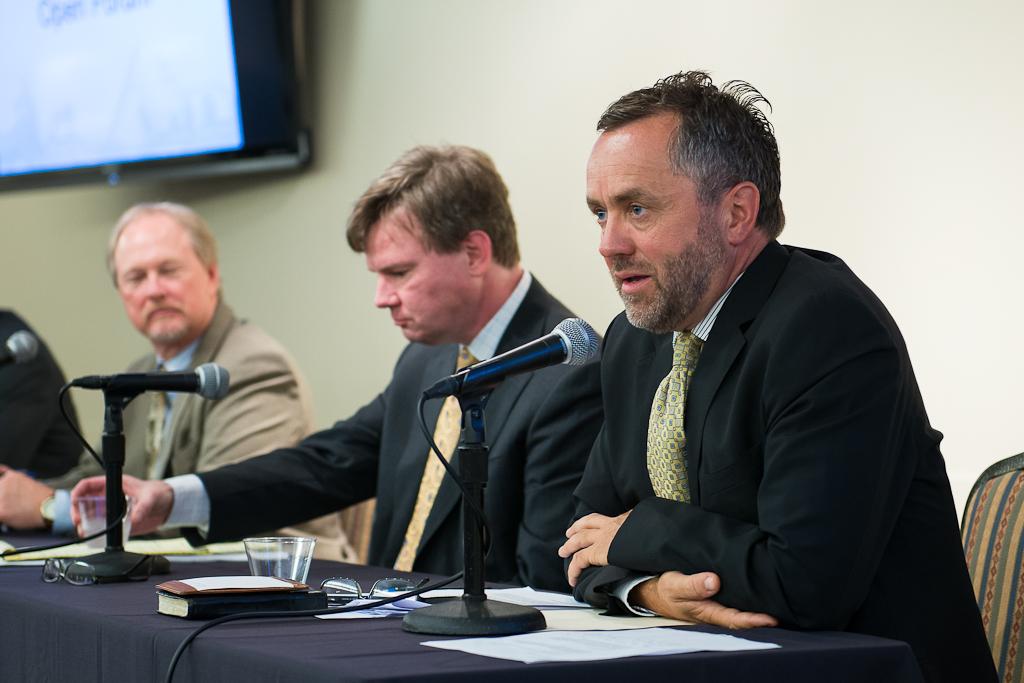
Answering questions at the HHS Open Forum, President Barry Corey eloquently responds with conviction. | Emily Arnold/THE CHIMES
Biola students who attended the panel discussion on Sept. 11 in the Caf Banquet room were informed about the university’s involvement in the increasingly publicized lawsuit against the federal government.
University president Barry Corey explained Biola’s reasons for pursuing the lawsuit. The U.S. Department of Health and Human Services mandated that employers must cover contraceptives in their health insurance plans — including certain abortion-inducing drugs. Religious organizations are exempted from this, but HHS has very specific criteria for that.
“This is, safe to say, the first time that a federal branch of government has defined religious organizations this narrowly,” Corey told the audience.
Biola does not qualify for exemption under this criteria, and would be required to provide coverage for abortion-inducing drugs in its insurance policies, he said, going on to state that Biola cannot provide abortifacients while remaining consistent with its values.
Moving forward to defend belief in sanctity of life
Corey then described the timeline of events for the lawsuit, beginning in the fall of 2011 and culminating on Aug. 23, when Biola filed the suit. Corey told the audience that in conversation with other university presidents, he had encountered support for Biola’s decision to move forward with the legal action.
“At the heart of this issue is religious freedom,” he said. “This is not a political posturing on Biola’s part.”
Following Corey’s briefing on the issues, Stan Jantz, chair of the Board of Trustees, explained the board’s role in deciding to move forward in the lawsuit. Shortly before the mandate’s announcement, the board had commissioned a task force to define Biola’s theological distinctives, one of which is the university’s belief in the sanctity of life.
Biola needs to take stands on moral issues, and the healthcare mandate seemed like God’s timing, Jantz said. He called the board’s decision to move forward with the lawsuit sobering but one made unanimously.
Baylor, explaining some of the legal aspects, called his representation of Biola a “unique and distinct honor” and applauded the university for standing up for religious liberty.
“The real problem is government arrogating to itself the power to tell a religious organization that it is not allowed to live its community life consistent with its values,” Baylor said.
He outlined the reasons he believes that religious liberty tends to be threatened.
“Theologically orthodox Christianity is increasingly out of step with culture, and especially out of step with the dominant elites that make the laws,” he said.
Floor opened for students and faculty to ask questions
After opening remarks, students and faculty had the opportunity to ask questions, which ranged from the likelihood of Biola prevailing in the lawsuit to the the consequences of losing.
A student asked about Biola’s prior inclusion of abortion-causing contraceptives in its health care plan. Corey said Biola reviewed its health care plan and discovered that certain contraceptives provided were in fact abortifacients. Corey assured the audience that these drugs were no longer covered by the university’s insurance policies.
One student questioned what final result the university was seeking with the lawsuit. Baylor responded that winning the case would not cause the legislation to be repealed or changed, but a verdict in Biola’s favor would prevent the government from applying it to the university. In other words, only Biola and its co-plaintiff Grace College and Seminary in Indiana would be affected.
Susan Elliott, director of Biola’s nursing department, was met with applause when she expressed her concern about the face of Biola’s stance on the contraceptive issue.
“If the other side of the argument was in the building, and we’re talking about birth control of women, they would look up and see a panel of white men telling women what they need to do,” Elliott said.
She then commented that the controversy has been made into a gender issue, and recommended that Biola involve Christian women in its public face on the lawsuit.
“We keep hearing, ‘this is what American women want,’” she said. “We are those women, and our voice should be heard.”
Each panelist was given about a minute for closing remarks.
“We are a faith-filled community, and when outside forces infringe upon who we are as a community and begin to force us to celebrate something else and erode our very core convictions, then we fail [at] being who we say we are, and I think that has significant implications for our culture … this is a very important issue for all of us,” Corey said.
After the event, panel members stayed to answer questions from students and faculty.
“I am proud to affiliate myself with Biola University because of their stand, whether it goes well or whether it goes poorly,” said Cassie Carsrud, a senior political science major.







